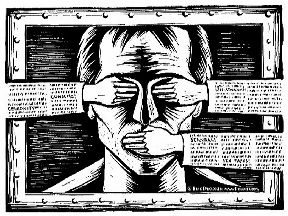/> Obama administration support for Syrian rebels is based on a United Nations authorized report from November 2011. In that document, Syria is accused of committing "crimes against humanity." The report's co-author is a board member at a Washington, D.C. based think tank that just happens to have the former chairman of ExxonMobil, a consultant for the Saudi Binladin Group, and a former CIA executive on its board of directors.
Much of the U.S. and European press on the so-called civil war originates from a tiny organization in the United Kingdom called the Syrian Observatory for Human Rights (the Observatory). The one man operation is run by a longtime opponent of Syrian Bashar Hafez al-Assad.
For the most part, this is how we know what we know about Syria.
The "human rights" rationale
The United Nations Human Rights Council authorized an independent committee to study human rights in Syria in 2011. The committee didn't visit Syria, claiming that the three members lacked access. Instead members set up a safe house in Switzerland, brought in individuals who claimed to have fled Syria, and took anonymous testimony on human rights concerns. This was the basis of the November 23, 2011 report to the UN HRC criticizing the Assad regime.
The report co-author, Karen Koning AbuZayd, is on the board of directors for the Middle East Policy Council in Washington DC. The board's vice chairman is the former head of a non-government organization that received over $50 million in 2011from U.S. Agency for International Development and other government agencies. The council received a $1 million grant from a Saudi prince in 2007.
The council strongly supports regime change in Syria as evidenced by the selection the spokesperson from the rebel Syrian National Council as a presenter for its July 23 Capitol Hill briefing for Congress.
The UN HRC failed to report on foreign fighters in Syria, foreign funding of the rebels, and human rights violations by the rebels over the past year, including terrorist suicide bombing. The report is selective, biased, and one sided. It is also the basis for of sanctions plus NATO and Gulf oil oligarch aid that turned an armed conflict into a civil war.
News from the front, Coventry, UK
The Syrian Human Rights Observatory is a one man operation located in Coventry, United Kingdom. Rami Abdul Rahman dispatches reports to the Western media from his apartment. He claims to have 200 sources on the ground in Syria. The sources don't know other sources and their names are a secret that only Abdul Rahman knows. He has not been there since his self-exile in 2001. He claims to be self-funded. He was part of the resistance to Assad and supports the Free Syria Army. Rahman is hardly objective yet his operation serves as the preeminent source for much of the Western media reporting on Syria.
Here are some recent examples of the Observatory in action. Their allegations are often cited in the first or second paragraphs of stories on the conflict,
MSNBC uses the Observatory for day to day reports on battles and outcomes: "The Syrian Observatory for Human Rights,
an opposition group, reported helicopter attacks on the central
Salaheddine district of Aleppo and fighting elsewhere in the city." MSNBC, July 28
Bloomberg
cited the Observatory for summary statistics on total deaths in the
conflict on both sides: "International and regional efforts have failed
to end the violence in Syria, which began in March 2011 and has left at
least 19,000 people dead, including about 5,000 government troops, according to the Observatory." Bloomberg, July 27
Even
Aljazeera uses the observatory as a primary source: "Civilians crowded
into basements seeking refuge from the bombing, with the SOHR's Rami Abdel Rahman describing the clashes as the uprisings fiercest". Aljazeera, July 29
The Western media apparently ignores itself. Reuters, which uses Observatory reports, did a profile of the organization and concluded that "it is virtually impossible to verify any data trickling out of the country." The media also ignored a major investigative article in Alakhbar, January 26. It provides more than enough reasons to question the death toll estimates, action reports, and the stability of the Observatory.
If regime change is such a great idea, why twist the truth and torture logic?
(Note: You can view every article as one long page if you sign up as an Advocate Member, or higher).






